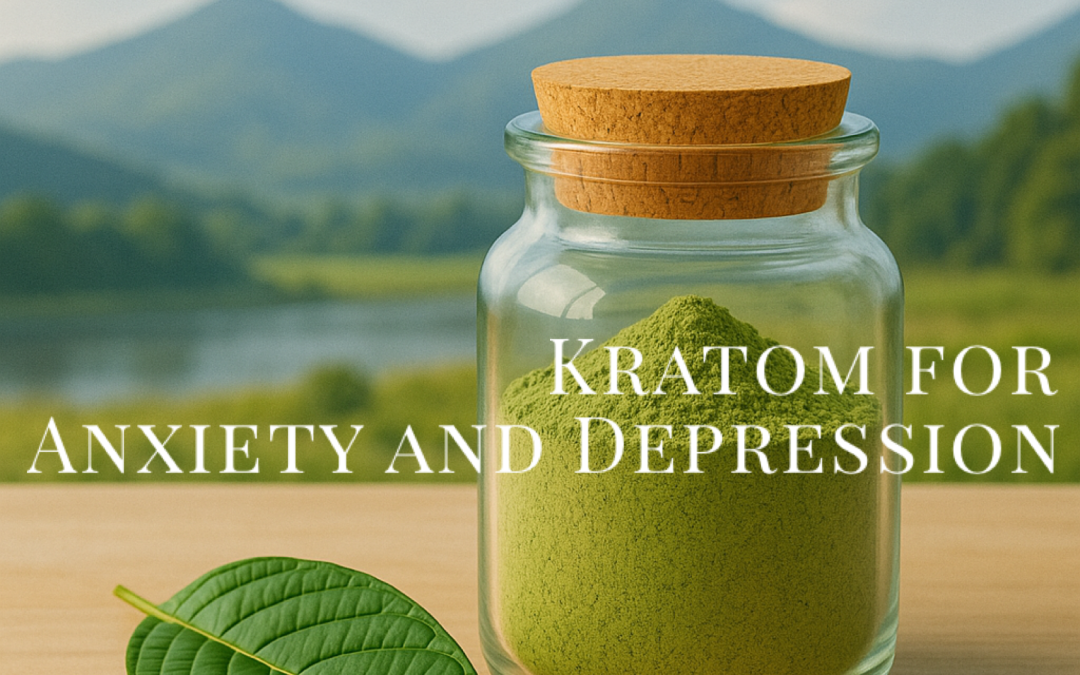Understanding Kratom’s Role in Mental Health
The growing interest in kratom for anxiety and depression reflects a broader shift toward natural alternatives for mental health support. As more individuals seek relief from stress, low mood, and emotional imbalance without relying on pharmaceuticals, kratom has emerged as a promising option. With its unique ability to both calm and uplift, kratom is gaining attention from those looking for new ways to manage anxiety and depression. In this article, we’ll explore how kratom works, what the research says, and what users should know before trying it.
Key Points
-
Natural Origin: Kratom (Mitragyna speciosa) is a tropical tree native to Southeast Asia, traditionally used for its stimulant and sedative properties.
-
Mood Enhancement: Some users report that kratom helps alleviate symptoms of anxiety and depression by promoting relaxation and improved mood.
-
Limited Scientific Evidence: While anecdotal reports are common, scientific studies on kratom’s efficacy for mental health conditions are limited and inconclusive.
-
Potential Risks: Kratom use may lead to side effects, including dependency, withdrawal symptoms, and other health concerns.
-
Regulatory Status: Kratom is not approved by the U.S. Food and Drug Administration (FDA) for medical use, and its legal status varies by state.
Kratom has gained popularity in recent years as individuals seek alternative remedies for managing anxiety and depression. The plant’s leaves contain compounds that interact with opioid receptors in the brain, potentially leading to mood-enhancing effects. Users have reported feelings of increased energy, improved focus, and relief from depressive symptoms.
A case study published in the Journal of Psychoactive Drugs detailed an individual’s use of kratom for self-managing depression and anxiety. The subject reported that kratom helped reduce hyperarousal, rumination, and job-related anxiety, enhancing sociability and suppressing depressive moods. However, during periods of increased stress, the effectiveness diminished, leading to a reliance on other medications.
Scientific Perspectives and Research
Research on kratom’s impact on mental health is still emerging. Some studies suggest potential benefits, while others highlight risks:
-
A systematic review in Drug and Alcohol Dependence indicated that kratom might have mood-enhancing and anxiety-relieving properties for some individuals.
-
Conversely, the FDA has expressed concerns about kratom’s safety, citing risks of addiction, abuse, and serious health consequences.
Potential Risks and Considerations
While some users find relief with kratom, it’s essential to be aware of potential risks:
-
Dependency and Withdrawal: Regular use can lead to dependence, with withdrawal symptoms including irritability, muscle aches, and mood disturbances.
-
Side Effects: Reported side effects range from nausea and constipation to more severe issues like liver toxicity and seizures in rare cases.
-
Lack of Regulation: The absence of standardized dosing and quality control can lead to variability in product potency and purity.
Legal and Regulatory Status
Kratom’s legal status in the U.S. is complex:
-
Federal Level: The FDA has not approved kratom for any medical use.
-
State Level: Legality varies by state, with some banning its sale and use, while others permit it under specific regulations.
Frequently Asked Questions (FAQ)
Q1: Can kratom effectively treat anxiety and depression?
A1: While some users report relief from symptoms, scientific evidence is limited, and kratom is not approved by the FDA for treating mental health conditions. But there are thousands of kratom advocates who report benefits. If you are considering kratom for anxiety and depression, weigh all of the evidence.
Q2: What are the risks associated with kratom use?
A2: Potential risks include mild dependency (similar to caffeine), withdrawal symptoms, side effects like nausea and variability in product quality due to lack of regulation.
Q3: What are the reported benefits of kratom use?
A3: Many users turn to kratom for natural pain relief, particularly for conditions like arthritis, chronic pain, and back pain, due to its active alkaloids that interact with opioid receptors. In smaller doses, kratom can act as a mild stimulant, boosting energy, focus, and productivity — similar to caffeine. Others use kratom to reduce anxiety and stress, enhance mood, and improve overall well-being, especially with red vein strains known for their calming properties. Kratom has gained popularity as a tool for easing opioid withdrawal symptoms such as muscle aches, nausea, and cravings. Some users also report better sleep and reduced social anxiety, depending on the strain and dosage.
Q4: Is kratom legal in my state?
A3: Kratom’s legality varies by state. It’s essential to check local laws and regulations before purchasing or using kratom. Here is a guide where you can check the legality in your state.
Q5: Should I consult a healthcare provider before using kratom?
A4: Yes. Always consult with a healthcare professional before starting any new supplement, especially for managing mental health conditions.
Disclaimer: This article is for informational purposes only and does not constitute medical advice. Always consult with a qualified healthcare provider regarding any health concerns or before starting new treatments.


